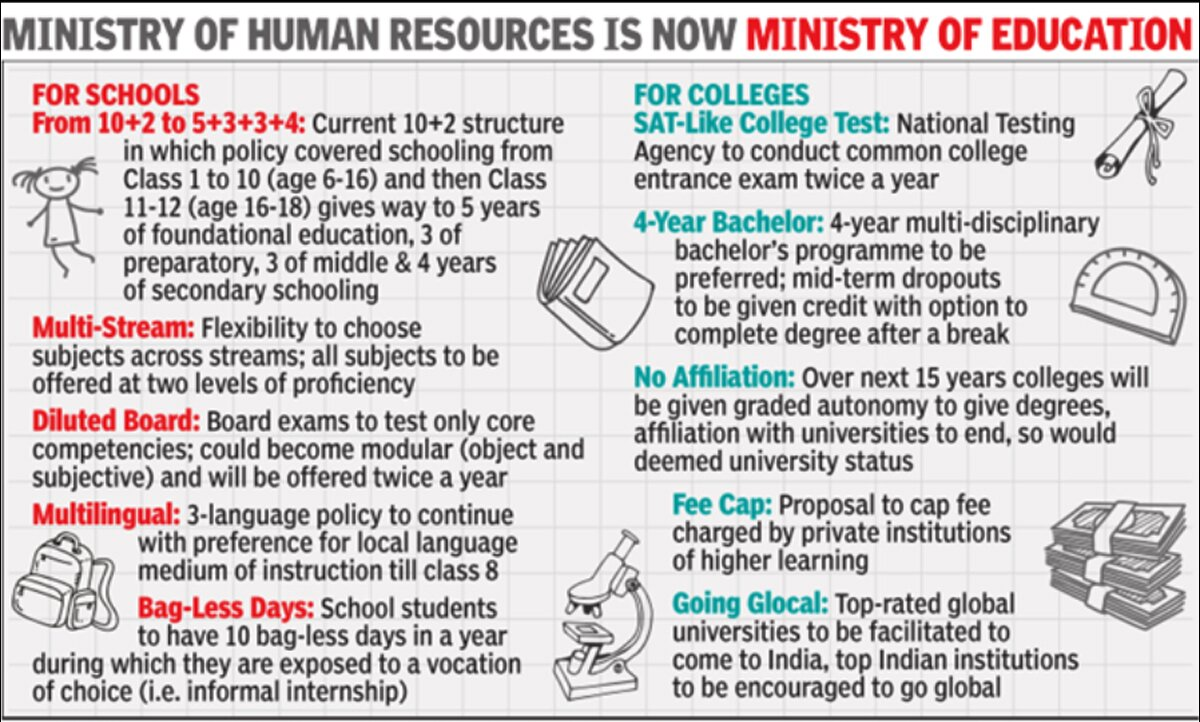Social Justice
Checklist For National Education Policy 2020
- 13 Nov 2020
- 7 min read
This article is based on “The missing links in National Education Policy” which was published in The Indian Express on 12/11/2020. It talks about the gaps in the National Education Policy and the way forward.
The National Education Policy 2020 (NEP) is a genuinely transformative and innovative policy document. Apart from fundamental literacy and numeracy and overall cognitive development, the NEP envisions imparting 21st-century skills, well-rounded character building, critical thinking, holistic, inquiry-based, discovery-based, discussion-based and analysis-based hands-on learning.
In a very welcome step, it also talks about strengthening the anganwadis and the mid-day-meal scheme. In this way, NEP champions many ideas which, if realised, can truly transform India’s declining education system.
However, it falls short in identifying what exactly has prevented the government from achieving these ideals. Apart from addressing it, there is also a need to evaluate the risks in some of its recommendations.
Associated Issues With NEP
- Marks Dominated Education System: In India, education is synonymous with examinations that focus on rote-learning and race to come first.
- This has led to mushrooming of industry out of coaching, tuition, notes, practice problems and finishing the syllabus.
- Until marks or grades dominate the education system, it would be challenging bringing transformation as envisaged by NEP.
- Persistent Inequity & Inequality: The NEP falls short in addressing the two main problems that plague our society and education system — inequity and inequality.
- The NEP addresses the issue of dropping out of schools at some length and suggests strengthening infrastructure and accessibility as a remedy.
- However, it does not investigate the structural causes of caste, economic background condition that may be rooted in inequality and discrimination.
- Possible Counteractive Effect: The NEP advocates that early education should be in one’s mother tongue.
- This welcome suggestion, however, should not result in underemphasize English, which is a great equaliser in our society and opens up the world for many.
- That may turn out to be discriminatory for some because the privileged will learn English anyway.
- There are similar risks with introducing optional vocational training in schools, as there are fears that it would turn out to be an exit route for the underprivileged.
- This welcome suggestion, however, should not result in underemphasize English, which is a great equaliser in our society and opens up the world for many.
- Federal Angle: Though education is a concurrent subject in India’s federal structure, yet the NEP approach is suggestive of over-centralization.
- It may be all right for the NCERT to provide broad curricular and pedagogical suggestions, but the guidelines should not become overbearing.
- Otherwise, there may be definite risks of stifling local cultures and contexts in the curricula.
- Knowledge-Jobs Mismatch: There is a persistent mismatch between the knowledge & skills imparted and the jobs available. This has been one of the main challenges that have affected the Indian education system since Independence.
- NEP 2020 failed to check this, as it is silent on education related to emerging technological fields like artificial intelligence, cyberspace, nanotech, etc.
- Huge Fiscal Burden: An ambitious target of public spending at 6% of GDP has been set. Mobilising financial resources will be a big challenge, given the low tax-to-GDP ratio and competing claims on the national exchequer of healthcare, national security and other vital sectors.
Way Forward
- Address the Debate on Reservation: Reservation has undoubtedly worked wonders in our country and has empowered many over the years. However, it has not been all smooth sailing, and there are some manifest structural problems.
- On the one hand, it is undeniable that it curbs opportunities of choice to many qualified young students. On the other hand, it acts as a tool for imparting social justice.
- Thus, the NEP needed to address this headlong.
- Need For Cooperative Federalism: Since education is a concurrent subject (both the Centre and the state governments can make laws on it), the reforms proposed can only be implemented collaboratively by the Centre and the states.
- Thus, the Centre has the enormous task of building a consensus on the many ambitious plans.
- Strive Towards Universalisation of Education: There is a need for the creation of ‘inclusion funds’ to help socially and educationally disadvantaged children pursue education.
- Also, there is a need to set up a regulatory process that can check profiteering from education in the form of unaccounted donations.
- Bridging Digital Divide: If technology is a force-multiplier, with unequal access, it can also expand the gap between the haves and have nots.
- Thus, the state needs to address the striking disparities in access to digital tools for universalisation of education.
- Interministerial Coordination: There is an emphasis on vocational training, but to make it useful, there has to be close coordination between the education, skills and labour ministry.
Conclusion
National Education policy 2020 is a transformative document, but mere changes in syllabus or even structure are unlikely to bring about fundamental changes in the Indian education system. Therefore, careful balancing is required to avoid unforeseen behavioural adaptations, causing them to end up as tools of exclusion and denial of opportunities.
|
Drishti Mains Question The National Education Policy 2020 (NEP) is a transformative and innovative policy document, but it needs to address the persistent issues in the Indian education system. Discuss |
This editorial is based on “PLI Scheme: Backing big firms and global champions is the way to go” which was published in The Financial Express on November 11th, 2020. Now watch this on our Youtube channel.







